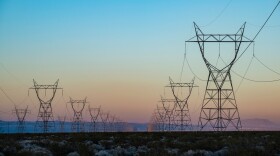-
As immigration enforcement expands nationwide, Native families say increased ICE activity is creating fear in their communities, even among U.S. citizens and tribal members.
-
Tribes could lease land or sell power — and it might be a way to diversify some tribal economies
-
Health and environmental advocates vow to fight it in court
-
Scott Socha is an executive at Delaware North, a company that contracts with the National Park Service to provide lodging and food at several national parks.
-
The power grid across Western states is under growing strain. Now, a new report argues the region’s governments and utilities need to work together to keep the lights on and costs down.
-
Less snowfall means less water in rivers and reservoirs. The economies in many of these communities rely in part on water activities.
-
At less than 140,000 square miles, snow cover across the region was the lowest ever recorded on February 1 in the satellite record, which goes back to 2001. The National Oceanic and Atmospheric Administration (NOAA) and the National Integrated Drought Information System (NIDIS) call it the “worst snowpack on record.”
-
Every state in the country has this kind of investment fund, except Wyoming and Mississippi. It could still be a long shot to pass.
-
Think of the phrase 'The Wildfire Crisis.' What comes to mind? Is it walls of flame marching through pine forests, laying siege to mountain towns? Recent research highlights a different and under-appreciated risk: fast fires racing through dry grass and brush – threatening neighborhoods.
-
The states with Democratic AGs argue that federal agencies are side-stepping important environmental laws to carry out the executive order.

Play Live Radio
Next Up:
0:00
0:00
Available On Air Stations










